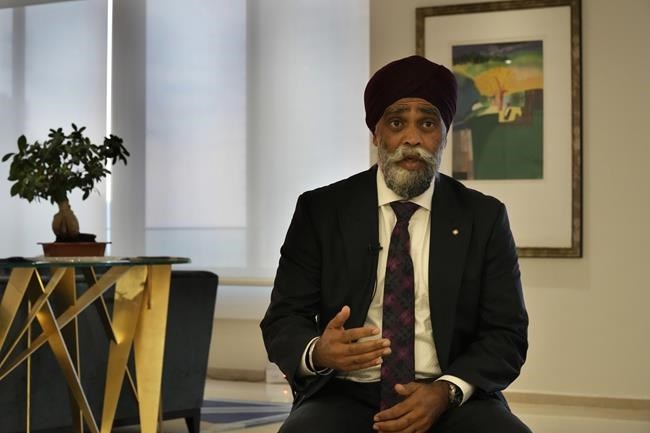OTTAWA — International Development Minister Harjit Sajjan says Russia's strikes on Ukraine's civilian infrastructure have him thinking about a historical famine, but that it’s too soon to tell whether Russia is committing genocide.
"When you look at the number of missiles that were actually on to target civilians, it's hard not to make the connection to the genocide that took place during (the) Holodomor," Sajjan said Thursday.
The Holodomor was a man-made famine in Soviet Ukraine that killed millions between 1932 and 1933, and Canada recognizes it as a genocide.
"They've seen atrocities in the past where (Russia) tried to facilitate — to try to starve Ukrainians. That's something that they knew very well through (the) Holodomor. And this is something that’s nothing new to them," he said.
This week, Russian missiles killed civilians and damaged some electrical infrastructure across Ukraine, in bombing not seen for months in large swaths of the country.
Sajjan said those airstrikes, and documented torture and massacres this year, amount to war crimes. He argued it is hard to not compare those airstrikes to the Holodomor.
"The type of war crime that they're talking about, the torture that has been committed, some of these stories will come out later — so I will say that this will determine what the actual terminology will be."
Sajjan was speaking to reporters by telephone from Canada’s embassy in Warsaw, Poland, after a visit to Lviv, a large city in one of the safest areas of Ukraine.
He was there to meet displaced people from across Ukraine, to assess what types of support the country might need this winter.
"We're looking at everything, from providing generators (to) clothing; the whole gamut," he said.
"That's why that needs assessment is very important, so that we get a good look at the exact needs across the country."
Sajjan added that recent airstrikes have added to that need.
"We anticipated that power infrastructure could be targeted; we just didn't think that Putin would be so deliberate in his method to do so."
Sajjan added that there is a clear need in Ukraine to boost support for women who have faced violence.
Ukrainian groups have argued Russia is intentionally perpetuating a genocide, citing rhetoric from Moscow about Ukraine not having a distinct culture and belonging to Russia.
MPs in April unanimously backed an NDP motion to "recognize that the Russian Federation is committing acts of genocide against the Ukrainian people." The House of Commons adopted that motion with unanimous consent, but did not hold a formal parliamentary vote.
This report by The Canadian Press was first published Oct. 13, 2022.
Dylan Robertson, The Canadian Press



